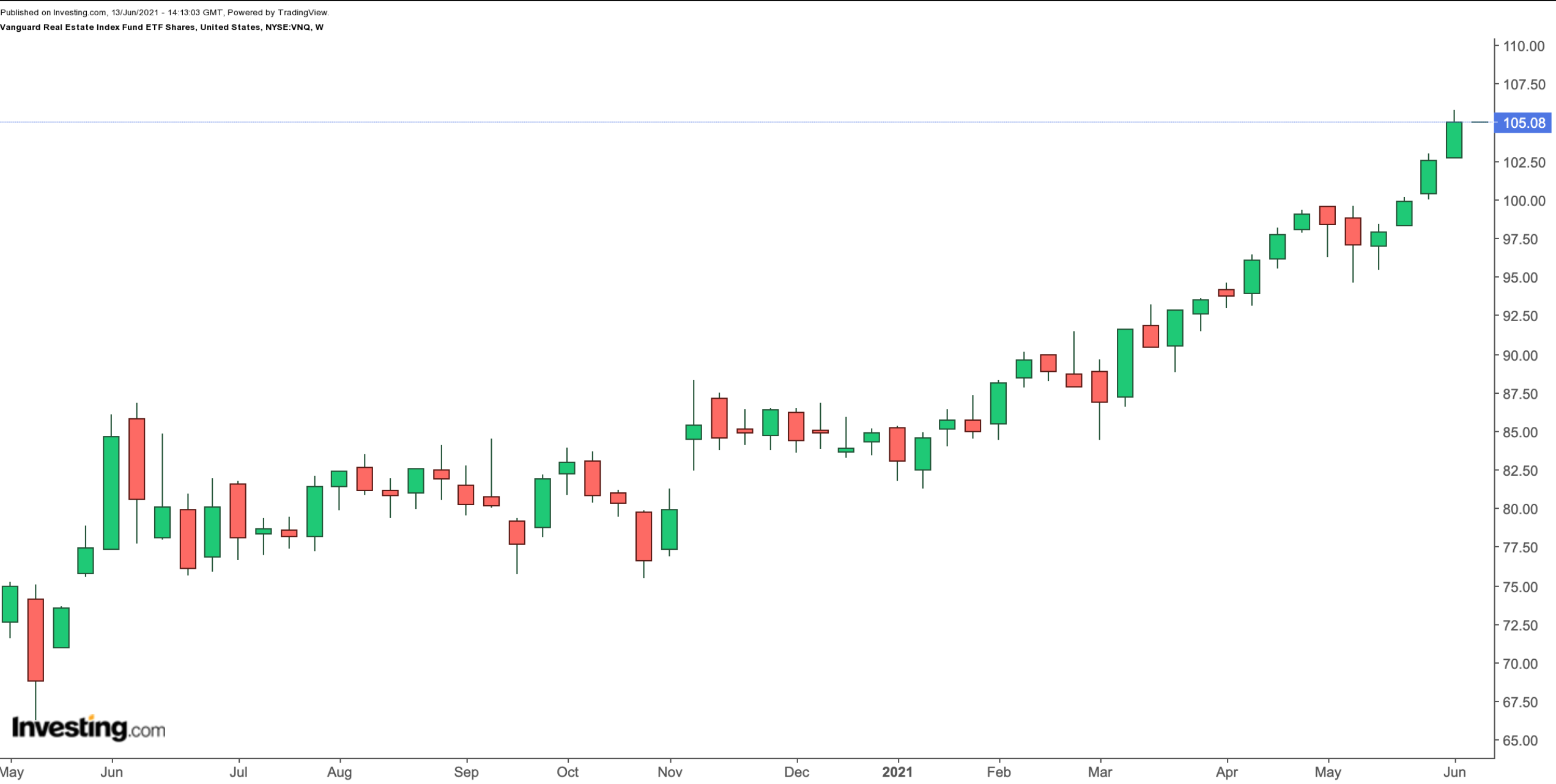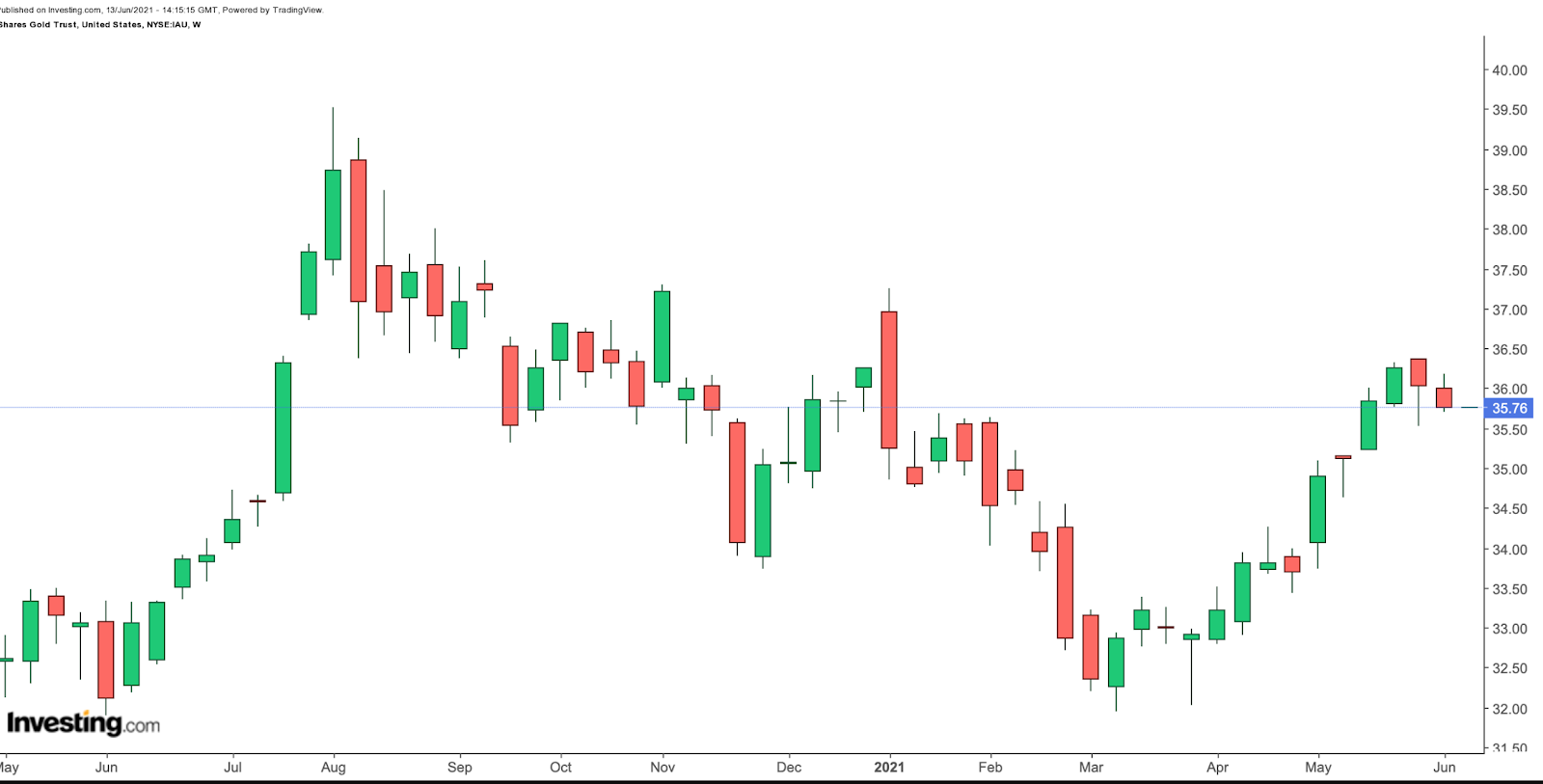In May, US consumer prices rose at their fastest level since 2008, i.e., the largest increase in over than a decade. The official inflation level, as measured by the Consumer Price Index (CPI), increased 5% year-over-year (YoY). according to the US Bureau of Labor Statistics:
“The index for all items less food and energy increased … 3.8 percent over the year.”
As the US economy recovers, fears of inflation are returning. For now, the Fed seems comfortable with these numbers as it believes the uptick in inflation is transitory. Nonetheless, analysts will still pay close attention to this week’s Federal Reserve monetary policy announcement. Investors wonder whether Fed’s loose monetary policies will soon end, and if the central bank will intervene by raising interest rates.
Research done by Schroders, based on market data since March, 1973, highlights:
“Bonds and equities … tend to respond negatively to rising inflation. For every 1% increase in the inflation rate (e.g. a rise from 2% to 3% over one year), US Treasuries and equities fell by 1.7% and 1.2% respectively. In contrast, gold and commodities … have historically rallied when the rate of inflation increased.” In addition, “US REITs (real estate investment trusts) came out on top” as a potential hedge against inflation.
Meanwhile, the US 10-year Treasury yield has fallen to 1.45, in part due to a decline in the price of copper. In other words, markets are actually debating whether the Street should worry about inflation or about a slowing of economic growth.
Therefore, today’s article introduces two exchange-traded funds (ETFs) that could be appropriate for readers who expect inflation levels to rise in the months ahead.
1. Vanguard Real Estate Index Fund ETF Shares
- Current price: $105.08
- 52-week range: $75.46 - $105.77
- Dividend yield: 3.06%
- Expense ratio: 0.12% per year
Our first fund, the Vanguard Real Estate Index Fund ETF Shares (NYSE:VNQ) invests in publicly-traded REITs. The National Association of Real Estate Investment Trusts (NAREIT) suggests:
“REITs provide natural protection against inflation. REIT dividends have outpaced inflation as measured by the Consumer Price Index in all but two of the last twenty years.”

VNQ, which tracks the MSCI US Investable Market Real Estate 25/50 Index, has 174 holdings. Since its inception in September, 2004, net assets have grown to $72.9 billion. In other words, it is one of the largest real estate ETFs.
The top three sectors of the fund include specialized REITs (37.7%), residential REITs (13.8%), industrial REITs (10.7%), retail REITs (10%), and health care REITs (8.%). Specialized REITs usually invest in telecommunications and data center spaces, which have seen increased growth in recent quarters.
The ten largest holdings constitute nearly 45% of that assets. In other words, the ETF is heavily weighted in those stocks whose performance might affect VNQ. The top five names are the Vanguard Real Estate II Index Fund (NASDAQ:VRTPX), American Tower (NYSE:AMT), Prologis (NYSE:PLD), Crown Castle International (NYSE:CCI) and Equinix (NASDAQ:EQIX).
VNQ returned 30% in the past 12 months and 23% year-to-date (YTD). On June 10, the fund hit an all-time high (ATH). As real estate price inflation stateside is showing no signs of easing, VNQ could offer a winning proposition. We like the sub-sectoral diversity and the dividend yield of the ETF. A potential decline toward $100, or even below, would improve the margin of safety for buy-and-hold investors.
2. iShares Gold Trust
- Current Price: $35.76
- 52-Week Range: $31.94 - $39.52
- Expense Ratio: 0.25% per year
Those investors who regard gold as a hedge against inflation risk might want to buy an ETF, such as the iShares Gold Trust (NYSE:IAU). The fund gives exposure to physical gold by tracking daily price movements of the bullion.
IAU, which began trading in Jan. 21, 2005, uses the London Bullion Market Association (LBMA) gold price as a reference benchmark. The fund currently has a net asset value of $30.4 billion. As of June 11, IAU had 16,169,915.67 ounces (502.94 tonnes) of gold in the trust. 
On May 24, 2021, the fund had a 1 for 2 reverse stock split which raised the share price and decreased the number of outstanding shares. Understandably, the total value of shares outstanding and the total value of a shareholder’s investment in the fund were not affected by this reverse split.
Although the fund is down more than 1.3% year-to-date, the return in the past 52 weeks is around 8.4%. For investors who expect gold to overtake the previous high seen in August 2020, IAU could be an alternative to investing in physical gold.
